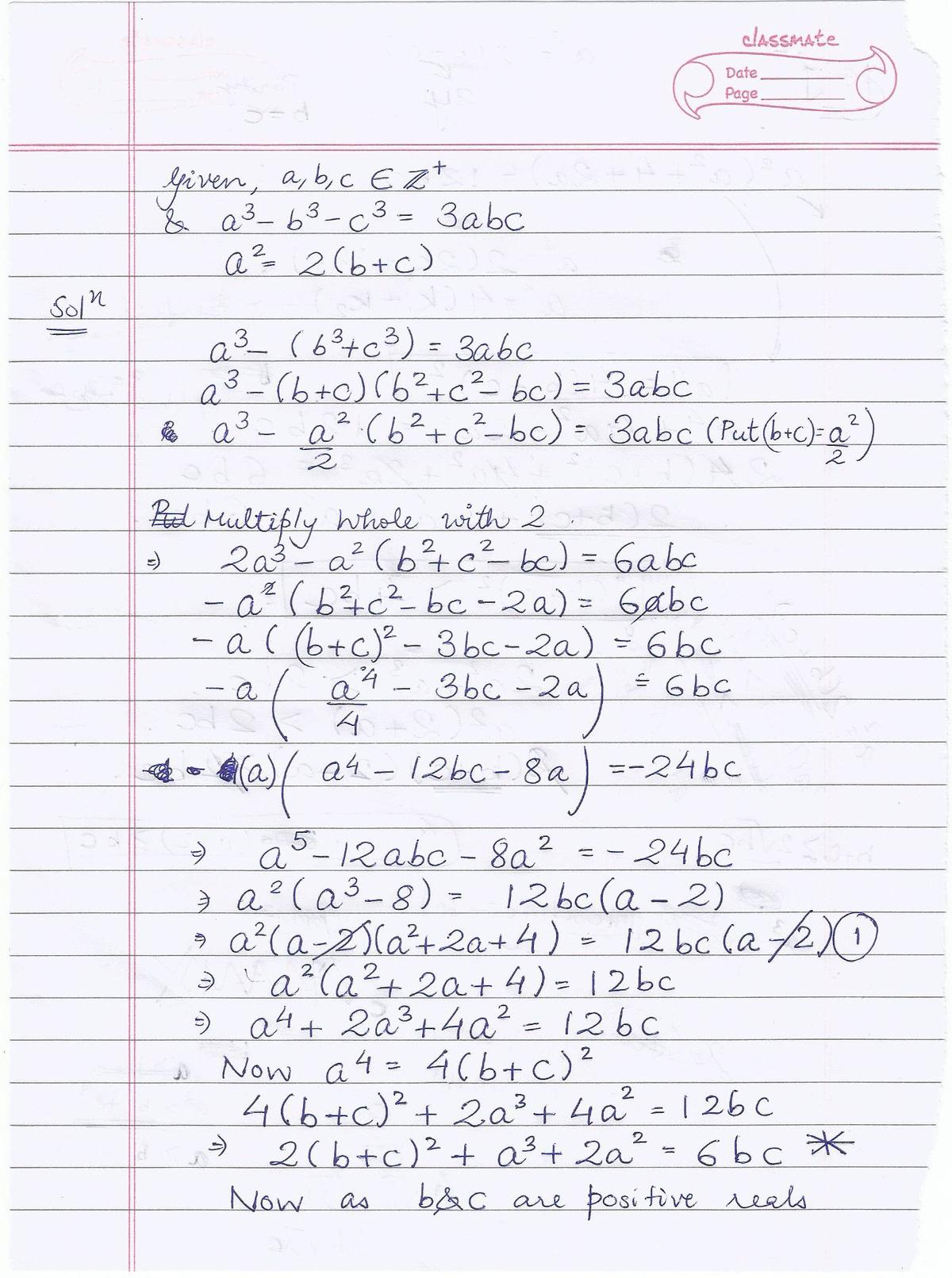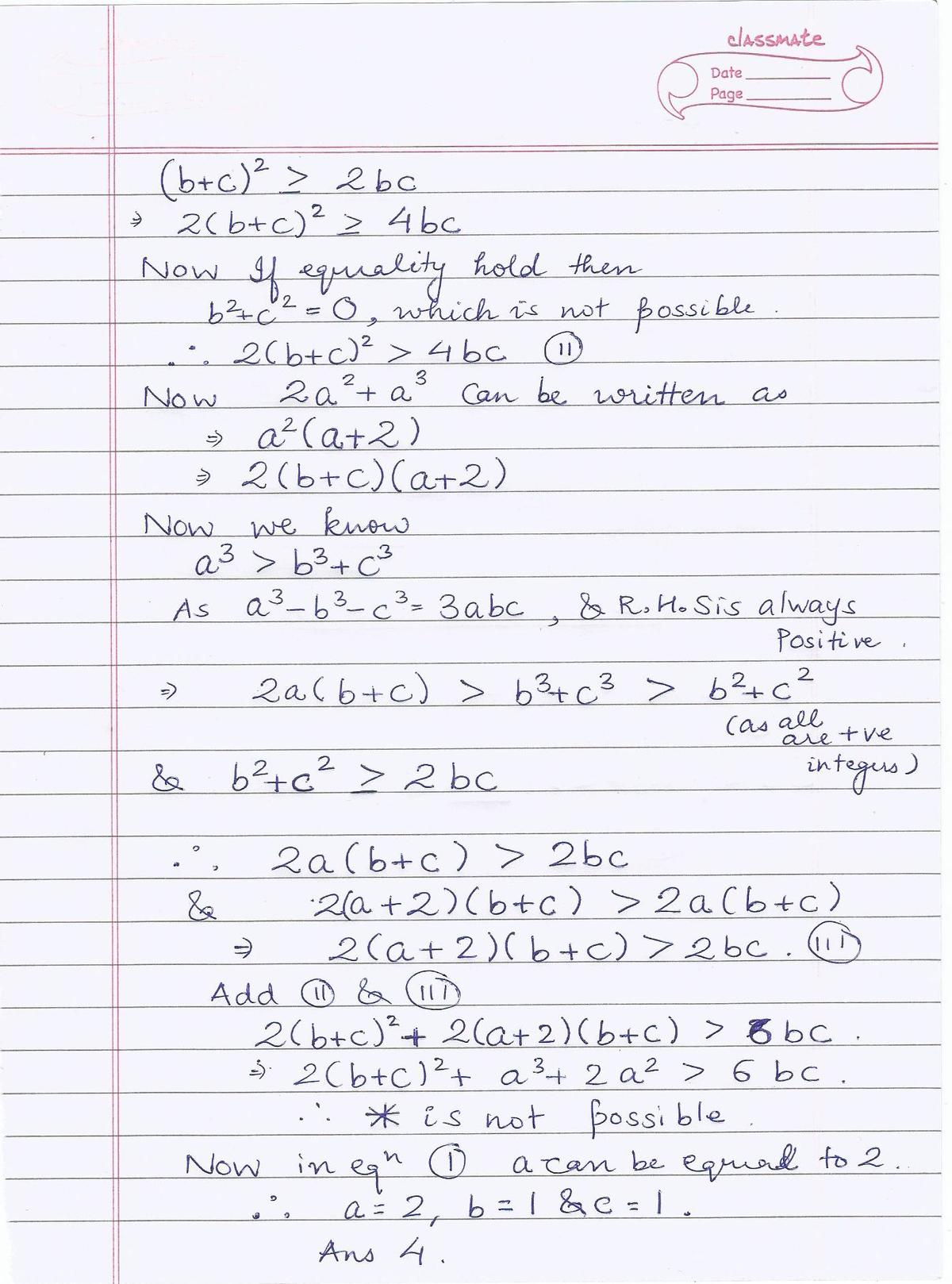Bro , do you even Euler?
a 3 − b 3 − c 3 a 2 = = 3 a b c 2 ( b + c )
Find the triplets ( a , b , c ) ∈ Z + that satisfy the system of equations above.
Details and assumptions :
- Input the sum of all possible numbers in the triplets as an answer. As an explicit example, if ( 1 , 2 , 3 ) is the only triplet, input 6 but if ( 2 , 3 , 4 ) is also an answer input 15.
The answer is 4.
This section requires Javascript.
You are seeing this because something didn't load right. We suggest you, (a) try
refreshing the page, (b) enabling javascript if it is disabled on your browser and,
finally, (c)
loading the
non-javascript version of this page
. We're sorry about the hassle.
5 solutions
A nice way to do this problem is to factor like this: a 3 − b 3 − c 3 − 3 a b c = ( a − b − c ) ( a 2 + b 2 + c 2 + a b + a c − b c ) As a 3 − b 3 − c 3 − 3 a b c = 0 , we have that a = b + c or another expression that makes the remaining factor zero. Luckily, the remaining factor can be expressed as (with quite a bit of work lol) ( 2 a − b + c ) 2 + 4 3 ( a + b ) 2 Which means you can just ignore it, since it can only be zero if you use 0. This is because with integers a + b must be 0 since both are squares, so one of a , b is not a natural number. Interestingly, this makes the other square a + c which implies ∣ a ∣ = ∣ b ∣ = ∣ c ∣ if we're using integers to solve this particular expression! (More specifically in the form (a,-a,-a))
The system is equivalent to (where k = b + c ) { a = k a 2 = 2 k So k = 2 , and a = 2 . Thus, a + b + c = 4 since there is only one way for natural numbers to sum to two. ( ( a , b , c ) = ( 2 , 1 , 1 ) )
Well done Dylan! Seems like you got the clue im the title huh? xD Check my other 2 questions too if you like!
Log in to reply
Thanks! Great problem :)
Log in to reply
Another alternative: a 2 + b 2 + c 2 + a b + b c − c a = 2 1 [ ( a + b ) 2 + ( b + c ) 2 + ( c − a ) 2 ] .
Nice solution!
Hi! I think that the problem has more 3 solutions... The problem says Z+, so 0 is valid. So we have (0,0,0), (2, 0, 2), (2, 1, 1) and (2, 2, 0). Am I wrong? And sure, if you want I show you how I get the others solutions.
Log in to reply
Hi, since Z + is taking only positive integers, 0 is not included and so those solutions aren't either.
Log in to reply
@Dylan Pentland – Hi! Z+ is taking the non-negatives integers numbers. So, we have to include 0. Read this, please: https://proofwiki.org/wiki/Symbols:Z
Log in to reply
@Thiago Machado – The only similar notation I found there was Z + which I think is different. I've always known Z + to be equivalent to N , which is what I am sure was intended. I know that whether or not zero is included isn't always clear (in fact the Wikipedia page on natural numbers says that half the time 0 is included) so if you still disagree you could report the problem and ask for clearer notation. :)
Log in to reply
@Dylan Pentland – Yeah... The notation must be clearer... Like 0^0... I'll report this problem! Thanks. ;D

 A little different approach!!
A little different approach!!
First expression implies that a − b − c = 0 giving a = b + c .Substituting this in second equation gives values of a as 0 or 2 .Therefore a = 2 .Again we know that a = 2 = b + c giving ( b , c ) = ( 1 , 1 ) as the only pair.Therefore only triplet satisfying this system is ( 2 , 1 , 1 ) .
Not so fast!You need some rigorous proof like the one Dylan Pentland has given.
Log in to reply
Ok i will try currently I am new to writing rigorous proofs,but I will soon learn and write another solution.Thank you for informing.
ovberrated..so simple from 1st
a=b+c
sub into 2nd
aa=2a a=2 from conditions.
only possibiity
(2,1,1)
Moderator note:
You have only shown that one solution exists. You failed to show that it is the only solution.
The second equation is equivalent to a 3 = 2 a ( b + c ) . We can substitute that into the first equation to get 2 a ( b + c ) − b 3 − c 3 = 3 a b c 2 a ( b + c ) − 3 a b c = b 3 + c 3 a = 2 b + 2 c − 3 b c b 3 + c 3 Since a > 0 and b 3 + c 3 > 0 , we must also have 2 b + 2 c − 3 b c > 0 . Rewriting this inequality a little gives us: b c − 3 2 ( b + c ) + 9 4 < 9 4 ( b − 3 2 ) ( c − 3 2 ) < 9 4 If b = c = 1 then this condition is met. However, if at least one of them is at least 2 , then we have ( b − 3 2 ) ( c − 3 2 ) ≥ ( 2 − 3 2 ) ( 1 − 3 2 ) = 9 4 . This is a contradiction since it implies 9 4 > 9 4 .
Hence the only possible solution occurs when b = c = 1 . Then a = 2 , so the answer is 4 .